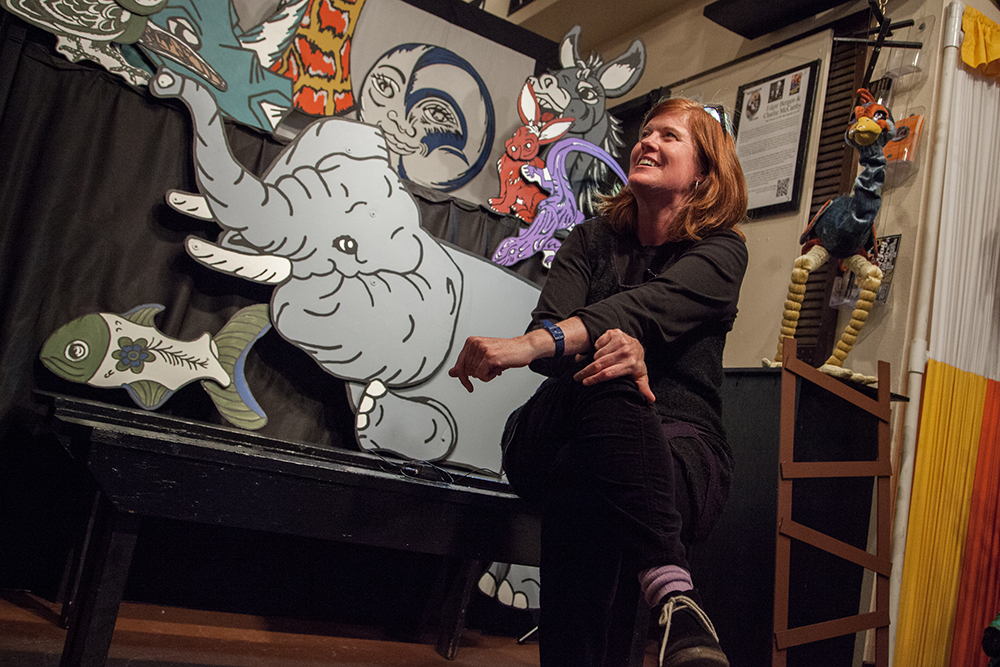Faculty Speaker Series covers an unusual way to teach world languages

Spanish professor Elizabeth Ubiergo sits with the puppets she helped create during her 2014 sabbatical project.
On Tuesday, May 12, at 4:00 p.m. in the Ellis Dunn Community Room (Gaiser Hall room 213), the Teaching and Learning Center hosts “Bilingual Puppetry: A project-based learning exploration,” the 2014 spring quarter installment of Clark College’s Faculty Speaker Series. Professor Elizabeth Ubiergo will present her sabbatical research on the use of puppetry and other forms of art and literature to enhance learning world languages.
Ubiergo’s research was prompted by realizing that her young daughter spoke better Spanish when talking with a toy than when talking with real human beings. She began wondering if this same technique could help her students at Clark, who often seemed to forget their Spanish language skills as soon as they had to use them in front of other people.
“There is a lot of research going on right now regarding performance-based language learning,” says Ubiergo. “I thought, maybe if my students had something to hide behind, like a large puppet, they could relax and get more from the experience.”
Ubiergo used her sabbatical to learn performance-based teaching techniques, build a series of large puppets based on classic works of Spanish literature, and create bilingual scripts for short plays to be performed with the puppets. After her sabbatical, she worked with students to perform the plays at the college’s annual Día del Niño/Latino Festival and in the classroom. They will also perform at the Portland Puppet Museum during the 2015 summer quarter.
While Ubiergo’s work is focused on the teaching of Spanish, her presentation will provide insight and advice to any teacher interested in exploring performance- and play-based teaching techniques.
About Elizabeth Ubiergo
Spanish professor Elizabeth Ubiergo has earned a Bachelor of Arts and a Master of Arts degree in Spanish language and literature from the University of Oregon. She also attended Universidad de Valladolid, Spain, and the Universidad Católica in Quito, Ecuador. Ubiergo has previous work experience with the University of Portland, Portland Community College, Chapman & Silva Translation Services, Universidad Católica—Ecuador, University of Oregon, and Clark College. She began teaching at Clark in 1994 and received tenure in 2008.
At Clark College, Ubiergo serves as co-advisor of the Spanish Club. She is the founder of Clark’s study abroad program in Valladolid, Spain, and this year began co-leading Clark students in a newly designed, two-week course of study in Mexico. She is the founder of the Mesa Redonda, a series of Spanish-language roundtable discussion groups which have been held at Clark for 13 years. She also served on Clark’s Financial Aid Committee, International Education Committee, and Latino Celebration Month Planning Committee. In addition, for more than a decade Ubiergo has served as an Advance Placement (AP) exam reader for the AP test in Spanish.
Ubiergo says her teaching philosophy emphasizes the importance of play in the learning process. “I tell my students that language learning should be fun and creative, not competitive and stressful,” she says. “Basically, students learn by speaking and making mistakes in authentic situations.”
About the Faculty Speaker Series
The Clark College Faculty Speaker Series showcases recent experiences that have enriched both the life and teaching of a Clark faculty member. Faculty members share their developmental experiences with the college community—and members of the community at large—while addressing some of today’s most intriguing issues.
Established by Clark College with support from the Clark College Foundation, the series honors individual faculty members and celebrates academic excellence.
Photos: Clark College/Jenny Shadley












